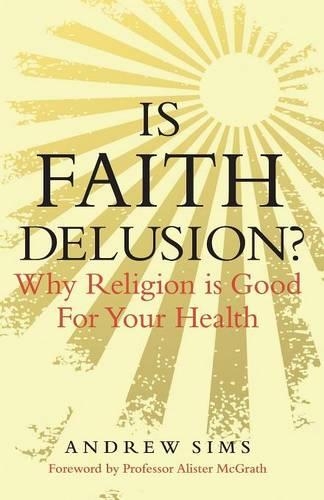
Is Faith Delusion: Why religion is good for your health
(Paperback)
Publishing Details
Is Faith Delusion: Why religion is good for your health
By (Author) Professor Andrew Sims
Bloomsbury Publishing PLC
Continuum International Publishing Group Ltd.
9th March 2009
United Kingdom
Classifications
Professional and Scholarly
Non Fiction
Spirituality and religious experience
Religion and science
261.515
Physical Properties
Paperback
252
Width 138mm, Height 216mm
316g
Description
Is faith delusion Is religion bad for your health How, in a scientifically and technologically advanced age, can people still believe in God/spirit/'other' Clearly not all believers are primitive and ill-educated; an alternative explanation is that they must be mad, or at least severely neurotic (as suggested by Freud). This bookstarts by lookingat, and giving reasons for, the connection and the division between Christian faith and psychiatry.It asks whetherscience challenges Christians involved with psychiatry, as patients or professionals, and whether the spiritual needs of patients are recognised.The authorexamines the scope and use of the neuro-sciences and considers cause and effect, natural selection and determinism.He exploresthe overlap (and the difference)between psychiatric symptoms and religious belief, the possible association between demon possession and mental illness, and the idea that some people are intrinsically religious and some are not. The variations of personalityare examined, with their implications for belief. Posited as a statement, that faith is delusion is always hostile, but outcome studies (reviewed here) show that in general religious belief and practice convey good mental health. Religious faith and mental illness are different, and their concepts come from different world-views. A consideration of them in relation to each other is long overdue. The author is a former Professor of Psychiatry and President of the Royal College of Psychiatrists, and has also been Chairman of their Spirituality and Psychiatry Special Interest Group, so is exceptionally well qualified to address the subject. Although the book is technically proficient, it is aimed at the general reader and is illustrated with stories, brief case histories and anecdotes.
Reviews
This authoritative book is a valuable resource for all who work in mental health and seek to justify the importance of spiritual care therein, and for others who wish to learn about belief and wellbeing. * Triple Helix, Easter 2010 *
And now for the yes. This is a thoughtful history of the struggle between religion and secular psychiatry... This personal account is also extremely frank and for that reason highly interesting. It is rare for a psychiatrist to write with so much emotion on his sleeve and for that reason alone it is to be welcomed. * British Journal of Psychiatry *
This is a remarkable book...extremely competent, erudite and readable. -- The Revd Jenny Francis * Church Times *
I have read this book with great admiration, with edification I would say, not just because I share the same religious dedication. However, I am a bit afraid to put it this way, as if it is no more than just a pamphlet written by an elderly man, who arriving at the end of his career needs to say once more what is only interesting for a certain incrowd. Nothing is further from the truth; we have definitely put that behind us. Sims accomplished to present a state of the art 'guideline' (not in a formal sense, of course), not in last place because he succeeded in shaping the apostolic admiration I earlier quoted in an irenic manner. * Dutch Journal of Mental Health *
As the need to understand mental health better is genrally more recognised, and the debate between atheism and theism sharpens, this is a very important book. * The Sign, March 2010. *
Part theological apologetics and part medical psychology, this book would be particularly suitable for theological libraries, but could hold more general interest too. Summing up: Recommended. Upper-level undergraduates through professionals/practictioners. -- G.R. Thursby * Choice, April 2010 *
Pastors will find this book useful as well as those who are professionally involved in psychiatry. -- Paul Richardson * Church of England Newspaper *
Author Bio
For more than twenty years, Andrew Sims was Professor of Psychiatry in the University of Leeds. He was consecutively Dean (1987-1990), President (1990-93) and the first Director of Continuing Professional Development (1993-97) of the Royal College of Psychiatrists. He has chaired the Spirituality and Psychiatry Special Interest Group of the Royal College of Psychiatrists and has also served on the General Medical Council. The author of 12 books and over 200 papers, he has published and spoken widely on the interface between religious faith and mental illness.
